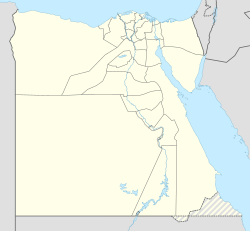| WV23 | |
|---|---|
| Burial site of Ay | |
 Restored sarcophagus with lid in the burial chamber | |
| Coordinates | 25°44′29″N 32°35′31″E / 25.74139°N 32.59194°E |
| Location | West Valley of the Kings |
| Discovered | 1816 |
| Excavated by | Giovanni Battista Belzoni (1816) Otto Schaden (1972) |
| Decoration | Four sons of Horus; Ay hunting |
| Layout | Straight |
← Previous WV22 Next → WV24 | |
Tomb WV23, also known as KV23, was the burial place of Ay, a pharaoh of the Eighteenth Dynasty, in the Western Valley of the Kings near modern-day Luxor. The tomb was discovered in 1816 by Giovanni Belzoni. Its architecture is similar to the royal tomb of Akhenaten at Amarna, with a straight descending corridor leading to a "well chamber" that has no shaft. This leads to the burial chamber, which contains the reconstructed sarcophagus, which was smashed in antiquity. The tomb was anciently desecrated, with many instances of Ay's image or name erased from the wall paintings. Its decoration is similar in content and colour to that of the tomb of Tutankhamun (KV62), with a few differences. On the eastern wall there is a depiction of a fishing and fowling scene, which is not shown in other royal tombs, normally appearing in burials of nobility.
